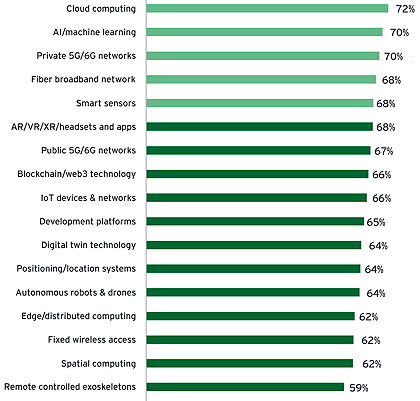The figures come from what is claimed to be the first study of its kind, in which the Finnish communications giant Nokia and the “professional services partnership” EY have surveyed 860 company representatives in four industry sectors (industrial goods and manufacturing; automotive; transportation, supply chain and logistics; and utilities) in six countries (the UK, US, Brazil, Germany, Japan and South Korea) on their attitudes to the metaverse.
The Metaverse at Work report defines the metaverse as a fusion of the digital and physical worlds. The industrial metaverse, it says, is characterised by physical-digital fusion and human augmentation focused on industrial applications, including digital representations of industrial environments, systems, processes, assets, and spaces that participants can control, monitor and interact with.
Just 2% of those quizzed for the survey dismiss the metaverse as being a buzzword or fad. Of those who have already adopted the industrial metaverse, 80% expect the applications they have tested to have a significant, or even transformative, impact on their businesses. Some 15% say it has helped them to cut capital expenditure, 10% that it has improved sustainability, and 9% that it has enhanced safety.
According to the survey, the UK is a front-runner in implementing metaverse concepts, with 64% of those quizzed reporting that they have piloted or fully deployed at least one industrial or enterprise metaverse application. This puts the UK just behind the US on 65%, and ahead of Germany (53%), Japan (49%) and South Korea (49%).
Nearly all of the respondents (96%) believe that by mixing physical and virtual applications, the metaverse could deliver additional innovative capabilities that will allow them to accelerate deployment, adoption and monetisation of Industry 4.0 in their businesses.
When asked which use cases they expect to deliver the most transformative value, those surveyed saw the highest potential in the use of extended reality to upskill their workforces, while three quarters cited the use of virtual R&D to enhance product design and processes.
When deploying metaverse applications, cloud computing was most widely mentioned technological enabler (cited by 72%) followed by AI (artificial intelligence) and machine learning (on 70%) and network connectivity (68-70%). At this stage, many enterprises are still relying on external partners to help them close capability gaps and to deploy applications.
Commenting on the survey findings, Thierry Klein, president of Bell Labs Solutions Research at Nokia, says: “It is great to see that companies clearly believe in the power of the metaverse for business value creation in both enterprise and industrial use cases. This strongly aligns with our vision, informed by more than 10 years of research at Nokia Bell Labs, that the metaverse is an extension of Industry 4.0.

According to those surveyed, cloud computing is the most important technology enabling the industrial metaverse, followed by AI/ML and private 5G/6G networks
“Consequently, those who have already implemented mission-critical communications networks for Industry 4.0 are now well placed to experience the benefits of the metaverse that clearly some companies are already seeing.”
“This study shows the clear appetite for technologies such as extended reality and digital twins to achieve business goals,” adds Vincent Douin, executive director of business consulting and business transformation at EY. “We are already seeing many organisations going above and beyond the planning stages and recognising tangible benefits from their initial implementations.”
Nokia: Twitter LinkedIn Facebook

